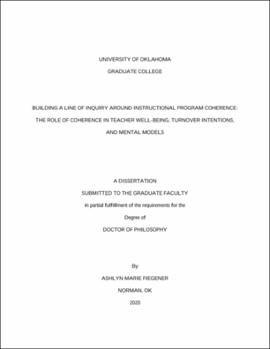| dc.contributor.advisor | Adams, Curt M. | |
| dc.contributor.author | Fiegener, Ashlyn M. | |
| dc.date.accessioned | 2020-05-11T20:15:46Z | |
| dc.date.available | 2020-05-11T20:15:46Z | |
| dc.date.issued | 2020-05 | |
| dc.identifier.uri | https://hdl.handle.net/11244/324387 | |
| dc.description.abstract | Previous studies suggest that instructional program coherence is related to higher student achievement and school improvement. There is little known about the process by which coherence operates in schools, specifically how it may create conditions in the instructional environment that enable teachers to thrive. The purpose of this three-study dissertation is to examine the relationship between instructional program coherence and measures of teacher well-being – namely, psychological need satisfaction and turnover. The first study tests the relationship between instructional program coherence and teacher psychological need satisfaction. The second study 1) examines the relationship between instructional program coherence and teacher intent to leave; and 2) tests teacher psychological need satisfaction as a mediating variable in the relationship between instructional program coherence and teacher intent to leave. Thus far, instructional program coherence has been conceptualized and measured as the alignment of structures (i.e., curriculum, assessments, professional development) within the instructional environment. A sole focus on structural coherence, however, neglects the role of human cognition in influencing teacher action and behavior. Mental models are the cognitive frameworks that guide action. The third study expands the work of coherence by conceptualizing a cognitive dimension of instructional coherence. Cognitive instructional coherence is defined as the sharedness of teacher mental models of a common instructional framework. A set of items are advanced to capture cognitive instructional coherence, and construct validity is tested through the assessment of content validity, structural validity, and convergent validity. | en_US |
| dc.language | en_US | en_US |
| dc.subject | Instructional program coherence | en_US |
| dc.subject | teacher turnover | en_US |
| dc.subject | teacher psychological needs | en_US |
| dc.subject | teacher mental models | en_US |
| dc.title | Building a line of inquiry around instructional program coherence: The role of coherence in teacher well-being, turnover intentions, and mental models | en_US |
| dc.contributor.committeeMember | Ware, Jordan K. | |
| dc.contributor.committeeMember | Forsyth, Patrick B. | |
| dc.contributor.committeeMember | Edwards, Beverly | |
| dc.contributor.committeeMember | Ford, Timothy G. | |
| dc.contributor.committeeMember | Kwon, Kyong-Ah | |
| dc.date.manuscript | 2020-05 | |
| dc.thesis.degree | Ph.D. | en_US |
| ou.group | Jeannine Rainbolt College of Education::Department of Educational Leadership and Policy Studies | en_US |
| shareok.nativefileaccess | restricted | en_US |
